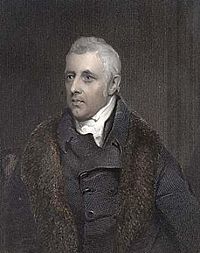Dudley Ryder, 1st Earl of Harrowby facts for kids
Quick facts for kids
The Earl of Harrowby
PC FSA
|
|
|---|---|
 |
|
| Secretary of State for Foreign Affairs | |
| In office 14 May 1804 – 11 January 1805 |
|
| Monarch | George III |
| Prime Minister | William Pitt the Younger |
| Preceded by | The Lord Hawkesbury |
| Succeeded by | The Lord Mulgrave |
| Lord President of the Council | |
| In office 11 June 1812 – 17 August 1827 |
|
| Monarch | |
| Prime Minister | The Earl of Liverpool |
| Preceded by | The Viscount Sidmouth |
| Succeeded by | The Duke of Portland |
| Personal details | |
| Born | 22 December 1762 London |
| Died | 26 December 1847 (aged 85) Sandon Hall, Staffordshire |
| Resting place | Lichfield Cathedral |
| Nationality | British |
| Political party | Tory |
| Spouse |
Lady Susanna Leveson-Gower
(m. 1795; died 1838) |
| Children | 8, including Dudley and Granville |
| Parents | Nathaniel Ryder, 1st Baron Harrowby Elizabeth Terrick |
| Alma mater | St John's College, Cambridge |
Dudley Ryder, who later became the 1st Earl of Harrowby, was an important British politician. He was born on December 22, 1762, and passed away on December 26, 1847. He was a key member of the Tory party, a major political group in Britain at the time.
Contents
Early Life and Schooling
Dudley Ryder was born in London. He was the oldest son of Nathaniel Ryder, 1st Baron Harrowby and his wife, Elizabeth. His grandfather was Sir Dudley Ryder, a well-known judge.
Dudley went to Harrow School, a famous school in England. After that, he studied at St John's College, Cambridge, one of the oldest universities.
Starting a Political Career
In 1784, Dudley Ryder was elected to Parliament. He represented the area of Tiverton, which his father had also represented.
His first government job was in 1789. He became a Joint Parliamentary Under-Secretary of State for Foreign Affairs. This role helped him deal with international matters.
In 1791, he was made a joint Paymaster of the Forces. This meant he helped manage money for the army. He also became Vice-President of the Board of Trade in 1790.
When his father died in 1803, Dudley inherited the title of Baron Harrowby. He then resigned from his government jobs.
Important Government Roles
In 1804, Dudley Ryder became the Secretary of State for Foreign Affairs. This was a very important job, dealing with other countries.
The next year, in 1805, he worked for his close friend, William Pitt the Younger, who was the Prime Minister. Ryder was sent on a special mission. He traveled to meet the emperors of Austria and Russia. He also met the king of Prussia. This mission was part of the Hanover Expedition.
In 1809, Dudley Ryder received a special honor. He was given the titles of Viscount Sandon and Earl of Harrowby.
From 1812 to 1827, he held another very important position. He served as Lord President of the Council under Prime Minister Lord Liverpool.
Later Political Influence
After 1827, Dudley Ryder did not hold any more official government jobs. However, he continued to be active in politics. He played a key role in the debates leading up to the Reform Bill in 1832. This law changed how people voted in Britain.
Even though he was a long-time member of the Tory party, he supported some big changes. He helped remove laws that discriminated against Roman Catholics. He also supported the movement to end slavery.
Family Life
Lord Harrowby married Lady Susanna Leveson-Gower in 1795. She was the daughter of Granville Leveson-Gower, 1st Marquess of Stafford. They had eight children together:
- Lady Susan Ryder (1796–1827)
- Dudley Ryder, 2nd Earl of Harrowby (1798–1882)
- Granville Dudley Ryder (1799–1879)
- Lady Mary Ryder (1801–1900)
- Lady Georgiana Elizabeth Ryder (1804–1844)
- Frederick Dudley Ryder (1806–1882)
- Edward Henry Dudley Ryder (1809–1811)
- Lady Harriet Charlotte Sophia Ryder (1811–1899)
- Lady Louisa Elizabeth Ryder (1813–1899)
Lady Susanna passed away in May 1838. Lord Harrowby lived for nine more years. He died in December 1847 at his home, Sandon Hall, in Staffordshire. He was 85 years old.
 | Jackie Robinson |
 | Jack Johnson |
 | Althea Gibson |
 | Arthur Ashe |
 | Muhammad Ali |

